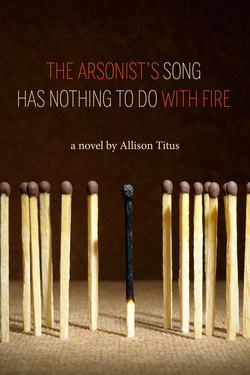Читать книгу The Arsonist's Song Has Nothing to Do With Fire - Allison Titus - Страница 24
На сайте Литреса книга снята с продажи.
ОглавлениеHis father stood over the stove in an ex-cowboy’s brown plaid shirt, stirring something with one hand while the other held a section of newspaper up to his face. Ronny paused on the front porch before going in, catching his breath and watching through the kitchen window. His father looked small standing there like that, like he’d aged ten years in five months. He was going blind—the doctors expected him to lose eighty percent of his vision by the end of the year—and forgetting things. Like the tumor was a cloud that had settled its fog over half his brain instead of just a thumbtack behind his left eye, which is how they’d said it, a thumbtack. Ronny shut the door, dialed the deadbolt back into place.
“Ron,” his father said from the stove, “there you are.”
“Hey,” Ronny said, and sat down at the kitchen table.
He had to calm down, cut it out, but who knew how far it would spread before someone stopped it—or no one stopped it—it was nearing winter, the trees were dying and the leaves were already dead, piles of dead leaves everywhere, everything could catch. He gripped the seat of his chair, the place where a long nail was wedged in at the wrong angle, and pressed his finger hard onto the point, held it there; the stab of pain calmed him a little, gave him something to focus on: the possibility of tetanus.
From the kitchen table he could see into the dining room, which they didn’t use anymore. There were piles of things stacked across the table. Papers, books, clothes to be donated to Goodwill; junk mail, real mail, a bag of apples gone soft. They didn’t gather there for meals now that it was just Ronny and his father. Not that they ever had. But the mathematical reality was that two people didn’t gather. Three gather. Nine gather, twenty-five. But ever since Pete was gone, and his mother and Ronny moved out, that room was done for. Now Ronny was back, and they were down to two again, and two, basically, meet and divide. Nothing to keep them from the smallness of themselves. That was the thing Ronny didn’t get—year after year the people around him continued to separate themselves out of the lives they were connected to. Like cells dividing, separating, multiplying. Like mitosis. That whole dining room could be a stain, an evolutionary cycle to be smeared on a slide and studied under better light. Fuck. Ronny had expected it to be emptied out by now, at least, but his father hadn’t touched it. The meantime hadn’t changed anything. It was depressing.
“Have you thought more about the job, Ron?” His father was talking to him from behind the refrigerator door, moving jars.
“Think it might be good for you, good opportunity, get you back in the swing of things.”
Sure. Ronny had thought about it. But the job was a fucking joke. It was janitorial—some lab needed housekeeping. A job that had been open probably for months and lingered, unfilled. It was embarrassing, honestly, but he couldn’t exactly go back to the Jungle, of course, no way. His boss had called a couple times when he didn’t show up for two shifts in a row, but hadn’t phoned since, which basically meant the coast was clear, but where did that leave him: not anywhere. Something had to give.
His eye caught Pete’s sweatshirt draped over a dining room chair. Its light blue matched the blue strobes of the wallpaper flowers. He tried not to let certain facts register. He concentrated on the fact of the sweatshirt’s blueness, the objective color of it rather than the powdery blue of skin that turns to pallor.
Obviously one of the stacks on the table was mail. Probably all Pete’s mail was still arriving. It had been, what, a little over a year and a half, and he wouldn’t put it past his father to just keep bringing it in. The magazine subscription, for example, month after month it would come. It takes a lot of energy to stop the momentum of an already-paid-for lifetime subscription of Road Cycling addressed to your dead son.
“Soup?” His father asked, placing the newspaper down on the counter. Clam chowder.
“Thanks,” he said, distracted.
It was too late to go back. It was out of his control. It wasn’t his.
Steam plumed from the bowl like breath through cold air and Ronny, who didn’t eat meat, didn’t even eat fish, found that he was starving.
